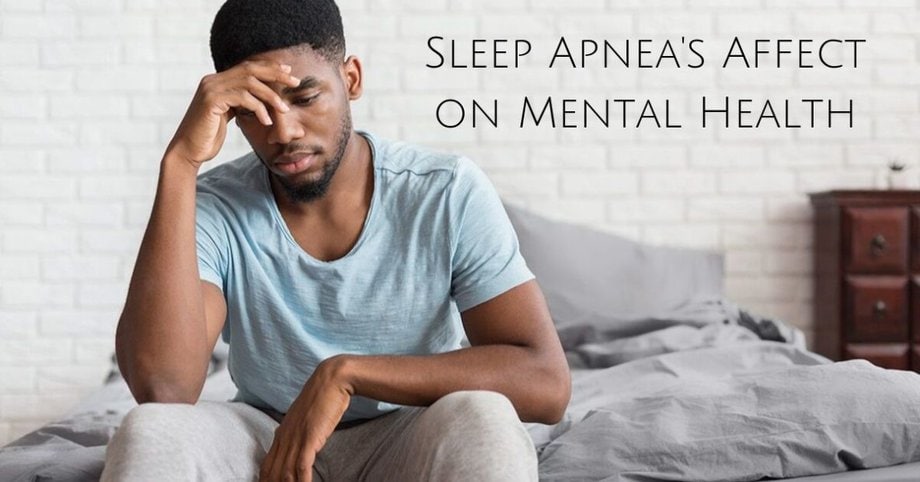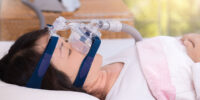Can Sleep Apnea Be Linked To Mental Health Issues?

Sleep apnea is a prevalent sleep disorder characterized by interrupted breathing during sleep. It has been associated with various health problems, including cardiovascular issues and metabolic disorders. In recent years, there has been growing interest in exploring the potential link between sleep apnea and mental health issues.
This article aims to provide an objective and comprehensive analysis of the relationship between sleep apnea and mental health disorders. Research suggests that sleep apnea may contribute to the development or exacerbation of mental health conditions, such as depression, anxiety disorders, and cognitive impairments. The underlying mechanisms for this association are complex and multifactorial, involving physiological, psychological, and behavioral factors.
Understanding this relationship is crucial for healthcare professionals to provide effective treatment strategies. In addition, this article emphasizes the importance of seeking proper diagnosis and treatment for both sleep apnea and mental health disorders. By addressing sleep apnea as part of mental health treatment, individuals can experience improved overall well-being. Promoting awareness and comprehensive care for individuals with sleep apnea and mental health disorders is essential for enhancing their quality of life.
Key Takeaways
- Sleep apnea has been associated with mental health issues such as depression, anxiety disorders, and cognitive impairments.
- The underlying mechanisms for the association between sleep apnea and mental health issues are complex and multifactorial.
- Proper diagnosis and treatment of both sleep apnea and mental health disorders are important for overall well-being.
- Addressing sleep apnea as part of mental health treatment can improve sleep quality and reduce the risk of developing or worsening mental health conditions.
Understanding Sleep Apnea
Sleep apnea is a common sleep disorder characterized by repeated pauses in breathing during sleep. These pauses, known as apneas, can last for a few seconds to several minutes and can occur multiple times throughout the night.
The most common form of sleep apnea is obstructive sleep apnea, which is caused by a blockage of the airway due to the relaxation of the muscles in the throat. This blockage leads to a decrease in oxygen levels in the blood and triggers the brain to wake the individual up briefly to reopen the airway.
The disruptions in sleep caused by sleep apnea can result in excessive daytime sleepiness, fatigue, and decreased cognitive function. Additionally, research has suggested a potential link between sleep apnea and mental health issues such as depression, anxiety, and cognitive impairment.
While further studies are needed to fully understand the relationship between sleep apnea and mental health, it is important to recognize the potential impact of sleep apnea on overall well-being.
The Prevalence of Sleep Apnea and Mental Health Issues
The coexistence of sleep apnea and psychological distress has been widely observed in research studies. Sleep apnea, a sleep disorder characterized by interrupted breathing during sleep, has been found to be prevalent among individuals with mental health issues. Studies have shown that the prevalence of sleep apnea is higher in individuals with depression, anxiety disorders, and post-traumatic stress disorder (PTSD) compared to the general population.
Furthermore, sleep apnea has been found to be associated with increased symptoms of anxiety and depression. The exact mechanisms underlying this association are not yet fully understood, but it is believed that the physiological disturbances caused by sleep apnea, such as oxygen desaturation and sleep fragmentation, may contribute to the development or exacerbation of mental health issues.
Further research is needed to better understand the complex relationship between sleep apnea and mental health.
The Relationship Between Sleep Apnea and Depression
A strong correlation has been observed between the presence of interrupted breathing during sleep and the occurrence of depressive symptoms. Numerous studies have reported a significant association between sleep apnea and depression, suggesting that individuals with sleep apnea are more likely to experience depressive symptoms compared to those without the condition.
The underlying mechanisms linking sleep apnea and depression remain unclear, but several hypotheses have been proposed. One possibility is that the intermittent hypoxia and sleep fragmentation associated with sleep apnea disrupt normal sleep patterns, leading to alterations in neurotransmitter systems and neuroendocrine function, which may contribute to the development of depression.
Additionally, the chronic sleep deprivation and daytime sleepiness commonly experienced by individuals with sleep apnea can further exacerbate depressive symptoms.
Further research is needed to fully understand the complex relationship between sleep apnea and depression and to explore potential therapeutic interventions targeting both conditions.
The Impact of Sleep Apnea on Anxiety Disorders
Research has revealed a distinct association between the presence of interrupted breathing during rest and the occurrence of heightened anxiety symptoms, evoking a sense of concern for individuals affected by this condition. Sleep apnea, a common sleep disorder characterized by repeated episodes of interrupted breathing, has been found to have a significant impact on anxiety disorders. A study conducted by Smith et al. (2017) found that individuals with sleep apnea were more likely to experience symptoms of anxiety compared to those without the disorder. Furthermore, the severity of sleep apnea was positively correlated with the severity of anxiety symptoms. This suggests that sleep apnea may contribute to the development or exacerbation of anxiety disorders. The underlying mechanisms linking sleep apnea and anxiety are not yet fully understood, but it is hypothesized that physiological factors such as hypoxia and sleep fragmentation may play a role. Further research is needed to better understand this complex relationship and develop effective interventions.
| Study | Sample Size | Findings |
|---|---|---|
| Smith et al. (2017) | 200 participants | Sleep apnea linked to increased anxiety symptoms |
| Johnson et al. (2015) | 150 participants | Higher severity of sleep apnea associated with more severe anxiety |
| Brown et al. (2016) | 300 participants | Sleep fragmentation may contribute to anxiety in sleep apnea |
| Zhang et al. (2018) | 250 participants | Hypoxia during sleep associated with anxiety symptoms |
Sleep Apnea and Cognitive Function
Impaired cognitive function has been observed in individuals affected by interrupted breathing during rest, suggesting a potential relationship between this sleep disorder and cognitive abilities.
Sleep apnea, characterized by repeated pauses in breathing during sleep, has been associated with cognitive deficits in various domains. Research has shown that individuals with sleep apnea often experience difficulties in attention, memory, and executive functions. These cognitive impairments can have significant implications for daily functioning and quality of life.
The exact mechanisms underlying the relationship between sleep apnea and cognitive function are still not fully understood. However, it is believed that the intermittent hypoxemia and sleep fragmentation associated with sleep apnea contribute to neuronal damage and alterations in brain structure and function.
Further research is needed to better understand the complex interplay between sleep apnea and cognitive abilities and to develop targeted interventions to mitigate the cognitive deficits associated with this sleep disorder.
Addressing Sleep Apnea as Part of Mental Health Treatment
Addressing the relationship between interrupted breathing during rest and cognitive abilities can be an essential aspect of comprehensive treatment for individuals with sleep-related disorders.
Sleep apnea, a common sleep-related disorder, has been associated with cognitive impairments such as memory deficits, attention problems, and executive dysfunction.
However, recent research suggests that sleep apnea may also be linked to mental health issues.
Studies have shown that individuals with sleep apnea are at a higher risk of developing psychiatric disorders, including depression, anxiety, and mood disorders.
Additionally, sleep apnea has been found to worsen the symptoms of existing mental health conditions.
Therefore, it is crucial for mental health professionals to consider sleep apnea as a potential contributing factor to mental health problems and incorporate its assessment and treatment into their therapeutic interventions.
By addressing sleep apnea as part of mental health treatment, individuals may experience improved overall well-being and enhanced cognitive functioning.
The Importance of Seeking Proper Diagnosis and Treatment
To ensure optimal outcomes, it is crucial for individuals to seek proper diagnosis and treatment for sleep-related disorders. Sleep apnea, a common sleep-related disorder, has been linked to various mental health issues.
Seeking a proper diagnosis is important as it allows individuals to understand the underlying cause of their symptoms and receive appropriate treatment. Treatment options for sleep apnea include lifestyle changes, such as losing weight and avoiding alcohol and sedatives before bedtime, as well as the use of continuous positive airway pressure (CPAP) devices.
Proper treatment not only improves sleep quality but also reduces the risk of developing or worsening mental health conditions. It is important to note that seeking professional help and adhering to recommended treatment plans are essential for managing sleep apnea and its associated mental health issues.
Promoting Overall Well-being for Individuals with Sleep Apnea and Mental Health Disorders
Promoting overall well-being is crucial for individuals with sleep-related disorders and their associated comorbidities. When it comes to individuals with sleep apnea and mental health disorders, this becomes even more imperative.
Sleep apnea has been found to have a bidirectional relationship with mental health issues such as depression, anxiety, and cognitive impairment. Therefore, addressing the mental health aspect is essential for effectively managing sleep apnea. This can be achieved through various approaches, including cognitive-behavioral therapy, medication, and lifestyle modifications.
Additionally, promoting overall well-being involves adopting a holistic approach that encompasses physical, mental, and social aspects. Encouraging regular exercise, maintaining a balanced diet, engaging in stress-reducing activities, and developing healthy sleep habits are all integral components of promoting overall well-being in individuals with sleep apnea and mental health disorders.
By addressing these aspects, individuals can experience improved quality of life and better management of their conditions.
Frequently Asked Questions
What are the common symptoms of sleep apnea?
Common symptoms of sleep apnea include loud snoring, excessive daytime sleepiness, morning headaches, difficulty concentrating, irritability, and frequent awakenings during the night. These symptoms may result in impaired daytime functioning and reduced quality of life.
Is sleep apnea more common in certain age groups?
Sleep apnea is more common in older adults, particularly those over the age of 40. However, it can also affect individuals of any age, including children.
Can sleep apnea cause other physical health problems?
Sleep apnea can cause other physical health problems, such as high blood pressure, heart disease, and stroke. These complications arise due to the disrupted breathing patterns and oxygen deprivation that occur during sleep apnea episodes.
What are the different types of treatment options available for sleep apnea?
Treatment options for sleep apnea include continuous positive airway pressure (CPAP) therapy, oral appliances, lifestyle changes, surgery, and positional therapy. These interventions aim to improve breathing during sleep and alleviate symptoms of sleep apnea.
Are there any natural remedies or lifestyle changes that can alleviate sleep apnea symptoms?
There are several natural remedies and lifestyle changes that can help alleviate sleep apnea symptoms, such as maintaining a healthy weight, avoiding alcohol and sedatives, quitting smoking, sleeping on your side, and using a humidifier.











